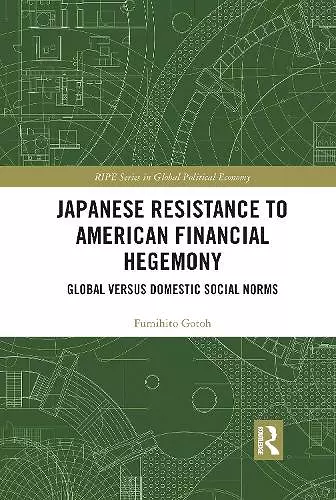Japanese Resistance to American Financial Hegemony
Global versus Domestic Social Norms
Format:Paperback
Publisher:Taylor & Francis Ltd
Published:30th Jun '21
Currently unavailable, and unfortunately no date known when it will be back
This paperback is available in another edition too:
- Hardback£155.00(9780367345303)

This book investigates why the convergence of Japan’s bank-centered financial system to an American-style capital market-based model has lost steam since the mid-2000s, despite financial deregulation during the 1980s and 1990s.
Examining the ideational conflict within Japanese elites between the market liberalization and anti-free market camps, it scrutinizes the American and Japanese credit rating agencies operating in Tokyo and explores the differences between the two major industrial associations, Keidanren and Doyukai, which have played a key role as "ideational platforms" for Japanese corporate society. The book emphasizes the concept of "systemic support", whose broadened definition incorporates dominant elites’ support and protection of subordinates in exchange for the latter’s obedience and loyalty. It argues that Japanese society’s anti-liberal, anti-free market norms centered on systemic support are a form of counter-hegemony, and this has resisted American financial hegemony, promoting international capital mobility and capital markets, and prevented capitalist dominance from severing long-term social ties such as management-labor cooperation and corporate group alliances. Yet this resistance has generated growing problems for Japan.
With a focus on social norms, bureaucracy, credit rating agencies, industrial associations and corporate governance, this book will provide useful insights for scholars and students of international political economy, sociology, cultural studies, and business studies.
"In the 1980s and 1990s financial deregulation was launched with great fanfare in Japan. In this book Gotoh tells an often overlooked story of how these ‘Big Bang’ reforms faltered and US-style capitalism was resisted. It is written with care and precision, highlighting the continuing challenges for Japan and the lessons for us all". – Professor Hugo Dobson, School of East Asian Studies, University of Sheffield, UK.
"The Japanese government enacted substantial financial and corporate governance reforms since the 1980s, yet Japan never converged on the US equity-based financial model. Fumihito Gotoh masterfully unravels this puzzle by demonstrating how the opponents of reform waged an ideological battle against the proponents of neoliberal reforms. They resisted American financial hegemony to preserve valued institutions, such as collaborative labor-management relations and long-term business partnerships." – Professor Steven K. Vogel, Charles and Louise Travers Department of Political Science, University of California, Berkeley, USA.
ISBN: 9781032088563
Dimensions: unknown
Weight: 290g
196 pages